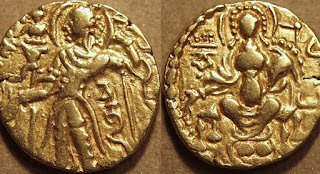Ancient Kingdoms of the North
After the death of Emperor Ashoka , the Maurya empire was on the decline . The successors of Ashoka were not very able . The last of them was Brihadratha . Defeating him , the Shunga dynasty came to power and Pushyamitra Shunga became king .
At this time , the Greeks had established independent States in India , in the north - west .
Indo - Greek rule :
The Greek kings who ruled in the region to the north - west of India were known as Indo - Greek kings . Menander , one of these kings , is referred to as ' Milinda ' in Indian writings . His kingdom extended from the Hindu Kush mountain , Kashmir up to Bundelkhand . He discussed Buddhist philosophy with the Buddhist Bhikkhu Nagasena . Their dialogue in the form of questions and answers is compiled in a book called ' Milinda - Panha ' , that is , * The Questions of Milinda ' .
After the Indo - Greeks , north - west India was invaded by Central Asian Tribes such as the Shakas and the Pahalavas . They established their small kingdoms in the north - western and western parts of India . Shakas and Pahalavas were assimilated into the Indian culture .
Kushana rule :
After the Shakas and the Pahalavas , the Kushanas came to India in the first century AD .
Emperor Kanishka :
Kanishka was a famous king of the Kushanas . His empire extended from Kabul to the west up to Varanasi in the east . Gold and copper coins minted by him have been found throughout North India . The fourth Buddhist council was held in Kashmir during Kanishka's reign .
Gupta rule :
The Gupta empire flourished in India in the period between 320 AD and 600 AD .
Samudragupta :
Shrigupta was the founder of the Gupta dynasty . The Gupta power became strong during the reign of Chandragupta I. He laid the foundation of the Gupta empire . He was succeeded by Samudragupta . He defeated the smaller neighbouring kingdoms . His empire spread from Assam up to the Punjab . He had also conquered the eastern coastal region up to Kanchi . Due to his growing might , kings on the north western frontier as well as those in Sri Lanka made treaties of friendship with him .
 |
| A coin of the Gupta period |
A stone inscription at Allahabad describes Samudragupta's conquests . His gold coins show him to be a patron of learning and arts and a lover of music
Chandragupta II :
After Samudragupta , his son , Chandragupta II ascended the throne . He conquered many kingdoms to the north - west . He was known as ' Shakari ' , that is , ' Enemy ( ari ) of the Shakas ' . He extended the Gupta empire to the north - west . He also annexed to his empire , the regions of Malwa , Gujarat and Saurashtra that lay to the west . He established relations with the powerful Vakataka rulers in the South by giving his daughter in marriage .
Fa Hien , the Chinese traveller , visited India during the reign of Chandragupta II . Fa Hien has written an account of his travels .
The Vardhan dynasty :
In the wake of the decline of the Gupta rule in the sixth century AD , the Vardhans rose to power in north - west India .
Emperor Harshavardhan :
Harshavardhan was the most renowned king of the Vardhan dynasty. He expanded his empire up to Nepal in the north, up to the river Narmada in the south, up to Assam in the east and Malwa in the west. With more than seventy-five thousand strong army, his military might was considerable. He had sent his ambassador to China. He used to tour all through his empire to supervise the administration, with a view to maintaining peace and order. Kanauj was the capital of Harshavardhan's empire.
Emperor Harshavardhan was a follower of Buddhism . The learned Buddhist Bhikkhu Yuan Chwang had come to India from China during Harsha's regime . Harshavardhan was a patron of scholars . He was himself poet and playwright . He wrote the plays Ratnavali ' and ' Naganand ' . For the convenience of the people in his kingdom , he built public dispensaries , inns and sheds providing drinking water . He a spent a large portion of his revenue for the welfare of the people . Every five years , he used to distribute all his wealth amongst the people . Harshavardhan is known in history for his munificence and concern for the welfare of his subjects .
 |
| Yuan Chwang |





